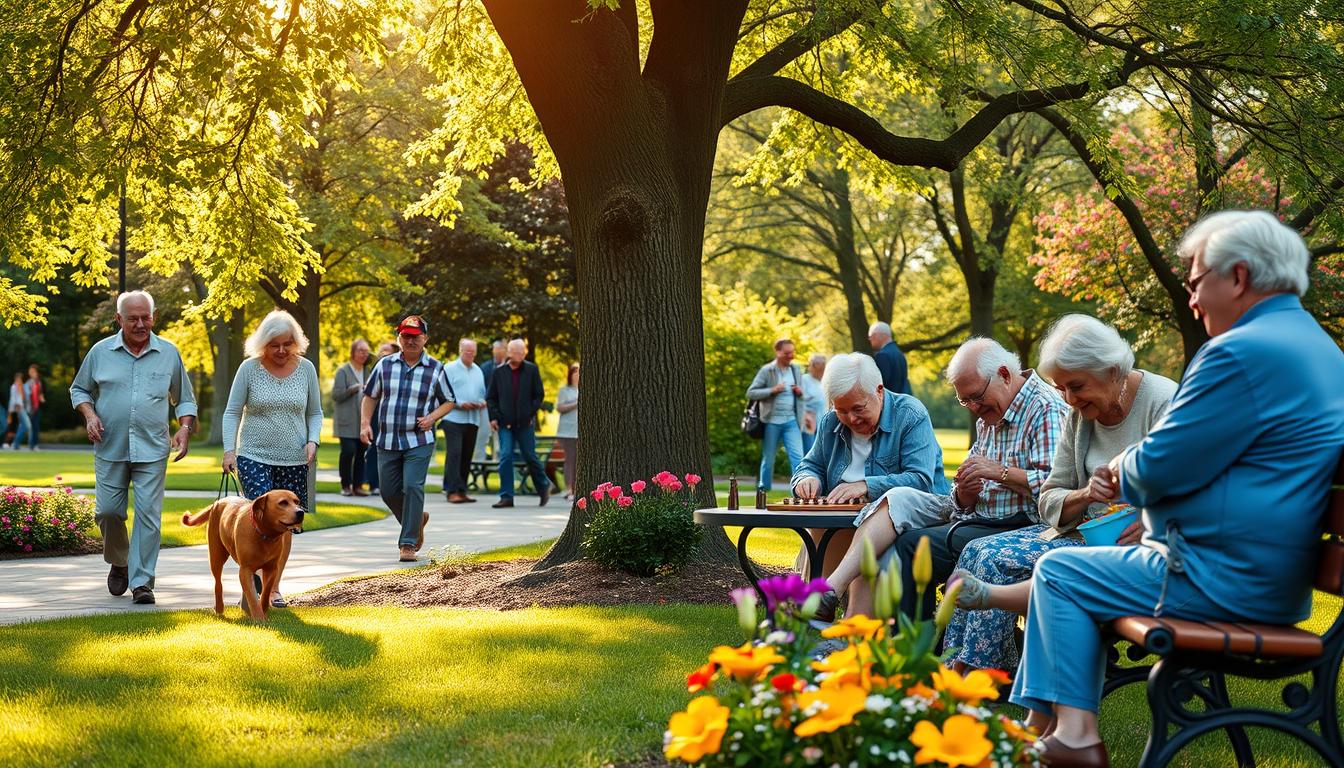Retirement is a new chapter full of growth and social connections. It’s key to start networking and making meaningful friends. These connections boost your happiness and give you a sense of purpose.
Anne Neville spent over 30 years in education. She found keeping in touch with old colleagues and students was essential for her happiness. Many others feel the same, with about 65% of teachers missing their work friends after retiring.
Anne started a walking group with retired colleagues. It quickly grew to over 20 members. This showed how important it is to have a community in retirement.
Retirement doesn’t mean you can’t stay connected to your work. Many retirees enjoy staying in touch with their field. For example, some retired teachers continue to help by tutoring or invigilating exams. This keeps them engaged and helps them remember up to 75% of what they learned.
Key Takeaways
- Retirement offers new opportunities for social connections and personal growth
- 65% of retired teachers miss connections with students and colleagues
- Maintaining professional ties can help retain up to 75% of work-related knowledge
- Engaging in social activities, like walking groups, can double participation rates
- Over 50% of retired educators engage in volunteer or community support roles
- Staying connected to your field can provide a sense of purpose in retirement
Understanding the Importance of Social Connections in Retirement
Social connections are key in retirement, boosting well-being and cognitive health. As we enter this new life stage, it’s vital to keep and grow our social circles.
Mental and Emotional Well-being Benefits
Good social ties are vital for mental and emotional health in retirement. Studies reveal that positive relationships and activities boost well-being. On the other hand, loneliness and isolation can harm health in older adults.
Meaningful social interactions help reduce stress, making them a key part of retirement benefits.
Preventing Social Isolation
Retirement can sometimes reduce social connections, like those with former colleagues. It’s important to keep and make new friends. Ways to avoid social isolation include:
- Joining local groups or clubs
- Volunteering in the community
- Using digital tools to stay in touch
- Doing activities with people of different ages
Maintaining Cognitive Function
Social activities are key for keeping the mind sharp in retirement. Research shows that those with big social networks and active engagement have better cognitive skills. They also face less cognitive decline.
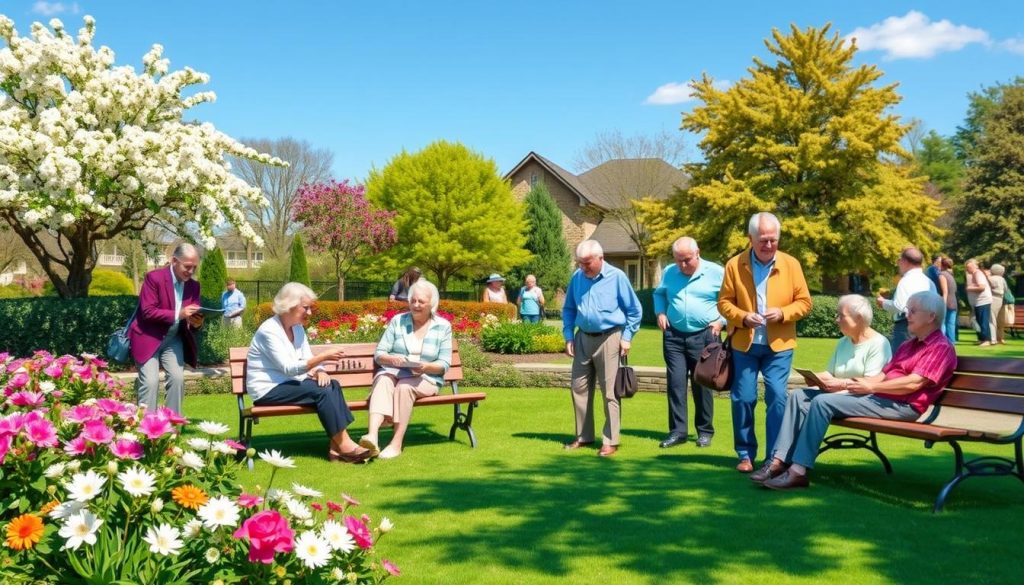
The idea of ‘cognitive reserve’ is that we build mental abilities over time. This can protect against cognitive decline later. By staying active and engaged, retirees can keep building this reserve, supporting their brain health.
Grow Your Network During Retirement
Retirement is a new chapter in life, full of chances to expand your social circle and make lasting connections. You might not see your colleagues as much anymore. But, there are ways to build a lively community in retirement.
Research shows that staying active in networking can cut down on feeling lonely by 40%. It also lowers the risk of depression by 30%. This highlights how key it is to keep and grow your social ties during this time.
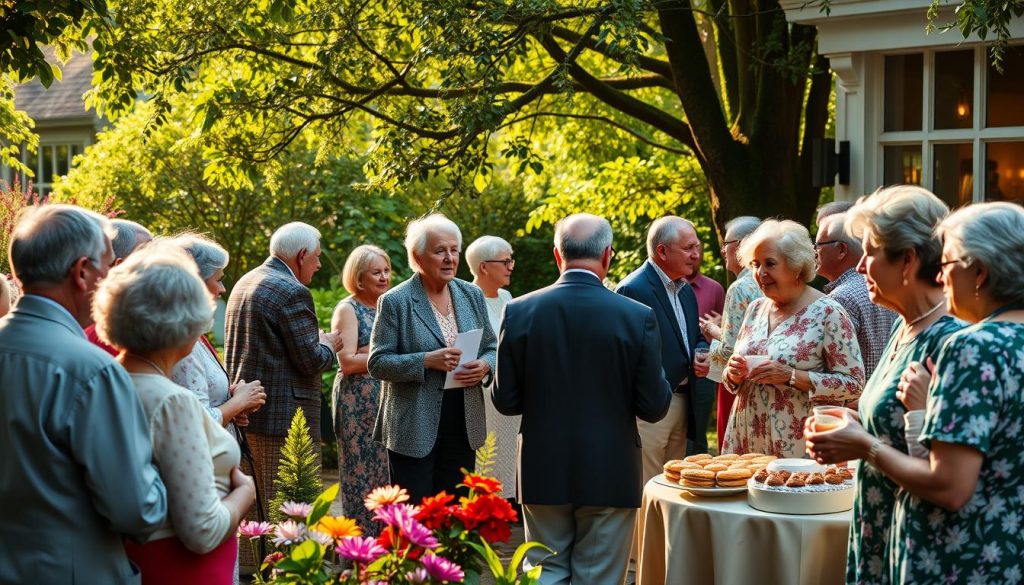
Getting involved in local activities, joining clubs based on your interests, and going to cultural events are great ways to meet people. These actions not only grow your social network but also boost your happiness.
Here are some top tips for networking in retirement:
- Volunteer for local organisations
- Join hobby groups or sports clubs
- Attend retirement planning seminars
- Participate in online communities for seniors
- Reconnect with former colleagues
Building relationships takes time and effort. Following up with people you meet can help keep those connections strong by 75%. By using these strategies, you’re more likely to form deep bonds, with a 65% success rate among retirees.
| Networking Activity | Potential Benefits |
|---|---|
| Volunteering | Sense of purpose, new friendships |
| Joining clubs | Shared interests, regular social interactions |
| Online communities | Wide-reaching connections, convenience |
| Former colleague meetups | Professional advice, familiar connections |
By getting involved in these activities, you’ll not only grow your social circle. You’ll also make your retirement more fulfilling with new views and chances.
Digital Networking Platforms for Retirees
The digital world is full of chances for retirees to keep in touch and expand their networks. With 70% of retirees seeing value in keeping professional ties, digital networking is key. It helps them keep learning throughout their lives.
Maximising LinkedIn for Professional Connections
LinkedIn is a top choice for retirees, with 61% using it to grow their professional circle. Keeping your profile up to date can boost your visibility by over 30%. This makes it simpler to reconnect with old colleagues and peers.
Social Media Engagement Strategies
Facebook also offers great chances for networking. With 1.8 billion people joining Facebook Groups each month, retirees can find groups that match their interests and work history.
Online Communities and Forums
Online spaces for seniors are perfect for sharing stories and learning from others. Being part of these digital communities can lead to new friendships and job chances. In fact, 68% of people say they’ve made new contacts at webinars and online events.
| Platform | Usage by Retirees | Networking Benefit |
|---|---|---|
| 61% | 30% increased visibility | |
| Facebook Groups | 1.8 billion monthly users | Community engagement |
| Industry Webinars | 68% find new connections | Specialised networking |
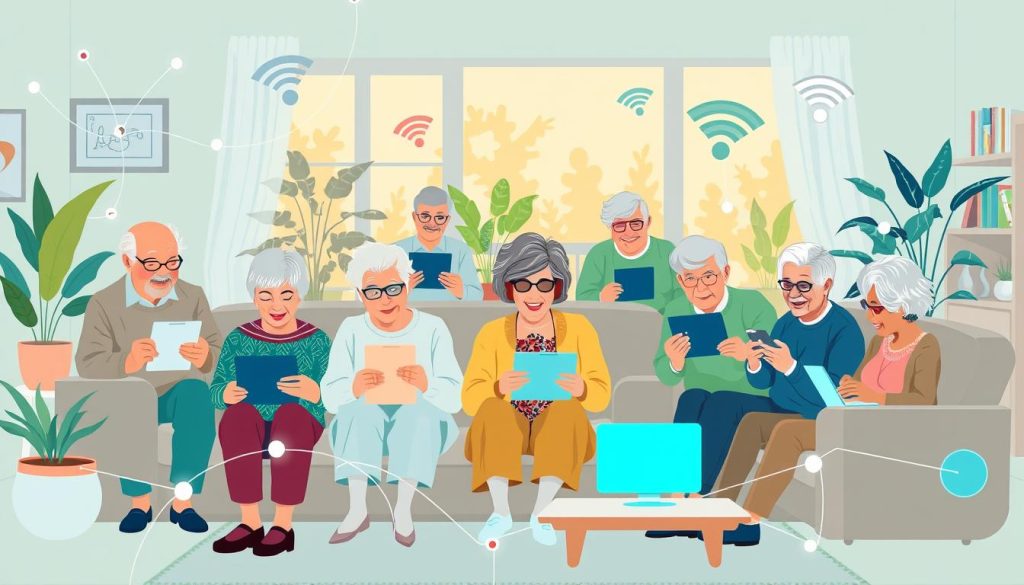
By using these digital tools, retirees can stay active in their careers, share their knowledge, and learn from others. The secret is to stay involved and be genuine. This way, retirement can be a time of growth and connection.
Community Involvement Opportunities
Retirement brings a new world of chances to get involved in the local community. Many find joy in volunteering, which helps others and builds new friendships. The UK has many ways to get involved, from helping charities to joining community events.
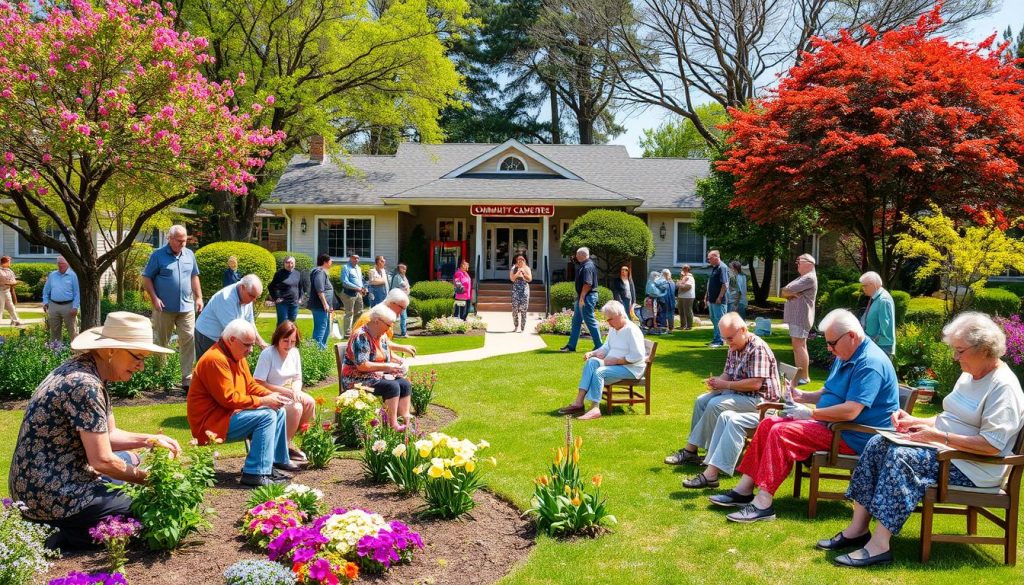
Did you know over 13,000 Science and Engineering Ambassadors are helping young people in STEM? This shows there are many volunteering roles out there. For those who care about health, groups like Cancer Research UK and the Alzheimer’s Society are always looking for help.
The Open Age charity helps people over 50 in over 50 community centres. They offer activities in more than 160 subjects. This means retirees can find something that matches their interests and skills.
- Join local boards or committees
- Participate in area business networking groups
- Volunteer for charities or community events
- Engage in intergenerational programmes
Interestingly, while retirement homes can help make new friends, only 41% of residents feel fully part of the local community. This shows how important it is to look for ways to get involved outside your home.
“This is a place where you can choose to live very privately and join in when you wish.” – 92% of residents in a survey of over 3,500 people.
Getting involved in the community can fight off loneliness, keep the mind sharp, and give a new purpose in life. Whether it’s through volunteering, joining clubs, or attending events, there are countless ways to grow and connect.
Leveraging Former Professional Relationships
Retirement doesn’t mean you have to leave your professional network behind. In fact, keeping these connections alive can lead to new chances and make your retirement more fulfilling. Let’s look at how you can keep and grow your professional network after you retire.
Maintaining Contact with Ex-Colleagues
It’s important to stay in touch with old colleagues. A simple coffee date or phone call can keep the bond strong. Remember, 80% of executives find their next job through networking. So, these connections could lead to new projects or part-time work if you want.
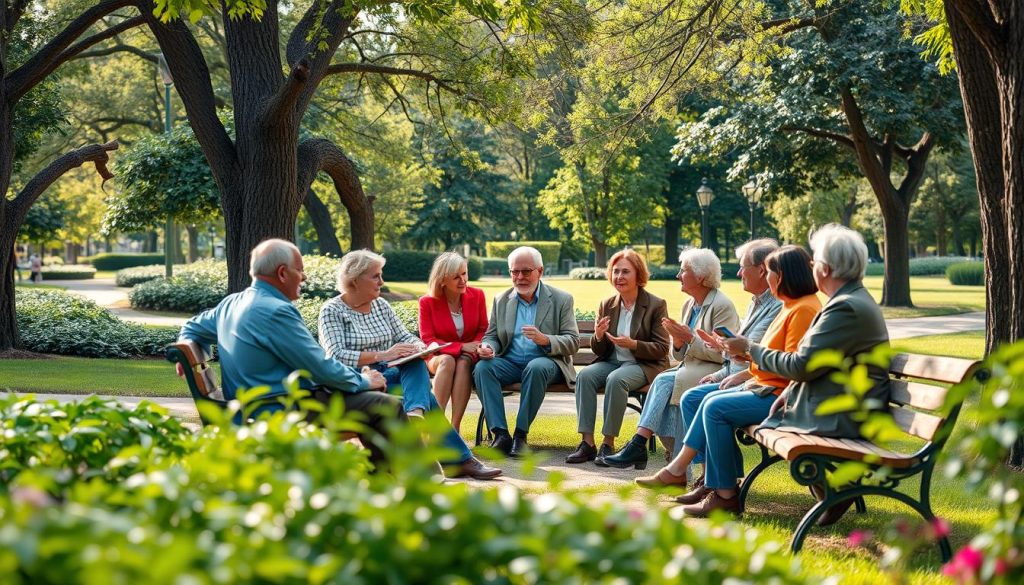
Building Alumni Networks
Your old university can be a great place to network. Alumni share a common background, making it easier to connect. Many schools offer online platforms or events for graduates to meet up. Being part of these networks keeps you updated on industry news and opens up new chances.
Industry Event Participation
Don’t avoid industry events just because you’re retired. They’re a great way to stay in the loop and be seen in your field. In fact, 65% of retired pros say these events help them stay relevant. It’s also a chance to pass on your experience to newer professionals.
| Networking Activity | Percentage of Retirees Engaged | Reported Benefits |
|---|---|---|
| Weekly social media engagement | 58% | Visibility and information sharing |
| Industry event attendance | 65% | Relevance and trend awareness |
| Alumni network participation | 75% | Industry insights and connections |
By using these strategies, you can keep a lively professional network in retirement. This opens doors to new opportunities and makes your retirement more rewarding.
Volunteering as a Networking Strategy
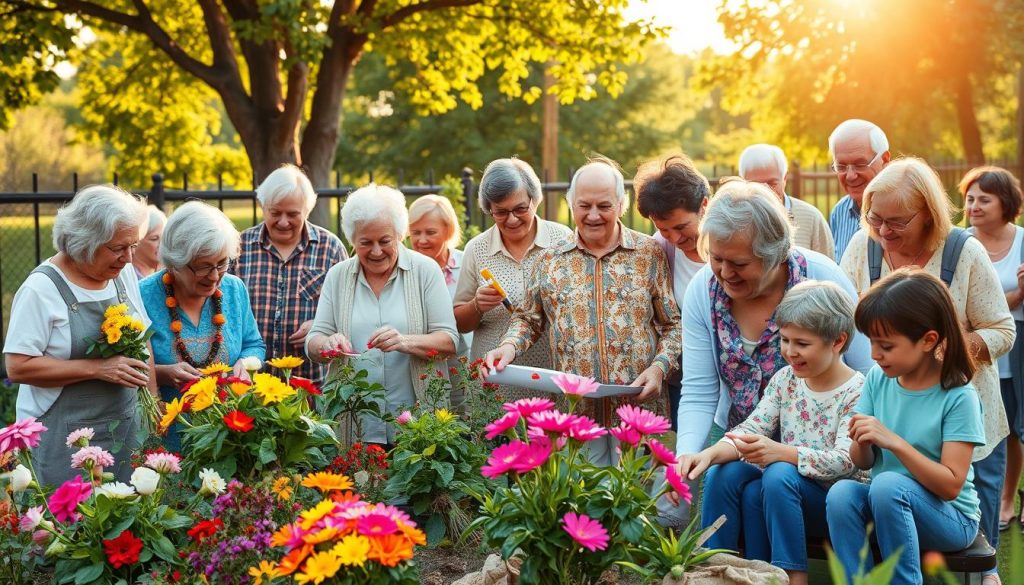
Volunteering in retirement is a great way to meet new people and help others. You can find activities that match your interests. This way, you’ll meet others who share your passions.
Retirees can also use their skills to help non-profits. This keeps you active in your field and opens up new connections.
- Enhances skills and expands professional networks
- Fosters connections with like-minded individuals
- Provides support and guidance for new ventures
Studies show volunteering boosts your networking. By 2001, many UK workers had changed jobs in just four years. This shows the need for a wide network.
“Volunteering not only helps others but also connects you with people who are passionate about the same causes.”
Look for local charities or projects that interest you. These can lead to lasting friendships and professional connections. The secret to good networking through volunteering is to be consistent and truly care about the cause.
Mentorship Programmes and Knowledge Sharing
Retirement mentorship is a great way to stay connected and help others. Many retirees enjoy sharing their knowledge with younger people. This sharing helps both the giver and receiver.
Finding Mentorship Opportunities
Retirees have many places to find mentorship:
- Alumni networks
- Professional associations
- Local community centres
- Online platforms dedicated to mentoring
These places help experienced people meet those who want to learn. Research shows 80% of mentees say mentorship helped their careers.
Reverse Mentoring Benefits
Reverse mentoring lets retirees learn from younger people. It keeps them updated with new trends and tech. This exchange of knowledge helps everyone understand and respect each other more.
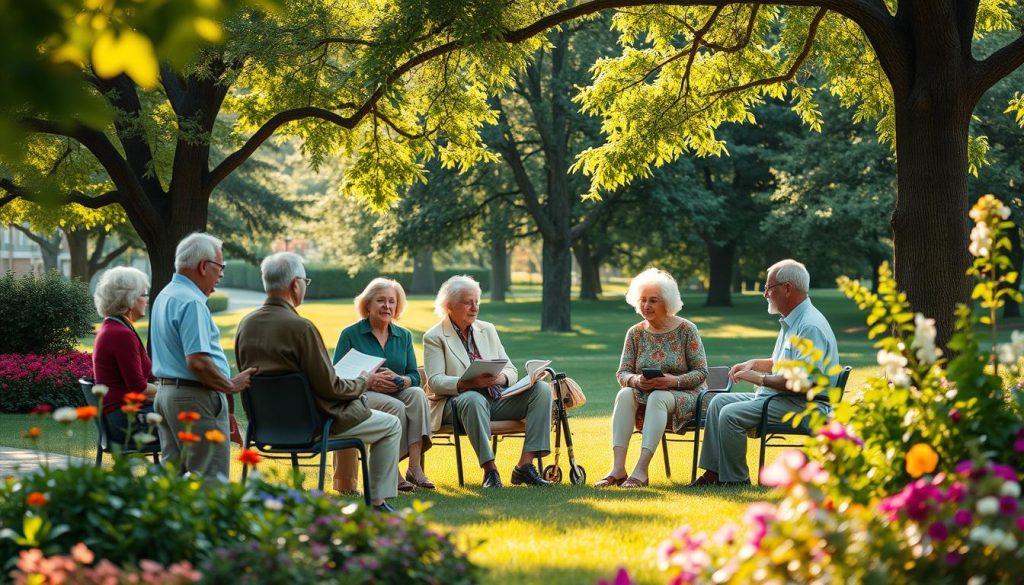
Skills Exchange Programmes
Skills exchange programmes let retirees share their skills with others. These programmes create a community of lifelong learners. People can teach what they know and learn new things, keeping their minds sharp.
| Mentorship Type | Benefits for Mentors | Benefits for Mentees |
|---|---|---|
| Traditional | Sense of purpose, ongoing learning | Career guidance, industry insights |
| Reverse | Technology updates, fresh perspectives | Leadership experience, confidence boost |
| Skills Exchange | New skill acquisition, social connections | Practical knowledge, networking opportunities |
Being part of retirement mentorship and knowledge sharing makes life richer. It’s a great way to stay connected, grow personally, and leave a mark in retirement.
Local Interest Groups and Clubs
Retirement is a great time to try new things and pick up old hobbies. Joining groups and clubs can help you meet new people and make your life more interesting. The Office for National Statistics says retirees in the UK are happier and more satisfied with life than others.
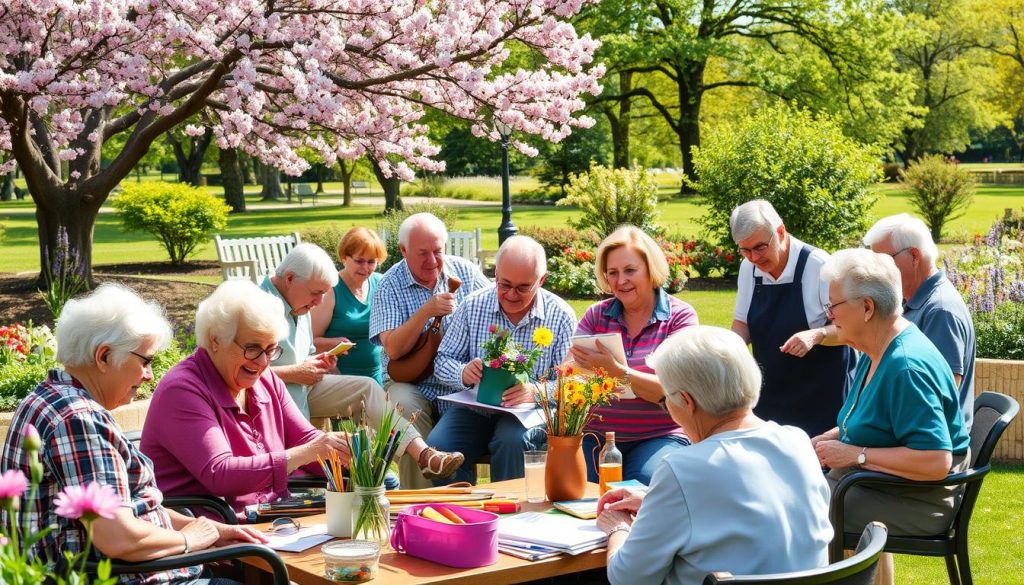
Are you into gardening, photography, or hiking? There’s a club for you. These groups let you meet others who like what you like. For example, Spice Social, the UK’s biggest social group for adults, has hundreds of events for different interests.
Being part of a group can make your retirement days more fun. Activities like book clubs or exercise classes can keep your mind sharp. The Joy Club, an online club, offers many activities to make retirement better.
- Stitch: A dedicated social community for the over 50s
- Meetup: Facilitates connections for community members seeking new social experiences
- The Oldie: An online platform tailored for individuals over 50
- Gransnet: A platform focusing on content and connections for grandparents
Joining clubs can really boost your mood and help you make friends. It’s always a good time to start a new hobby or pick up an old one. So, why not join a local group today? You might find your next best friend!
Creating Meaningful Connections Through Hobbies
Retirement is a chance to explore new hobbies and deepen old passions. Doing hobbies brings joy and opens up social connections. Let’s look at how hobbies can help you build strong relationships through shared interests.
Hobby-based Social Groups
Joining groups based on hobbies is a great way to meet people. Whether it’s a book club, gardening group, or photography club, these meetings are for sharing experiences. Research shows that people in these groups have 30% more social interactions than those who don’t join.
Recreational Activities
Physical activities are good for both health and making friends. Golf clubs, tennis leagues, or walking groups are perfect. About 70% of retirees want to meet new people, making these activities great for socialising.
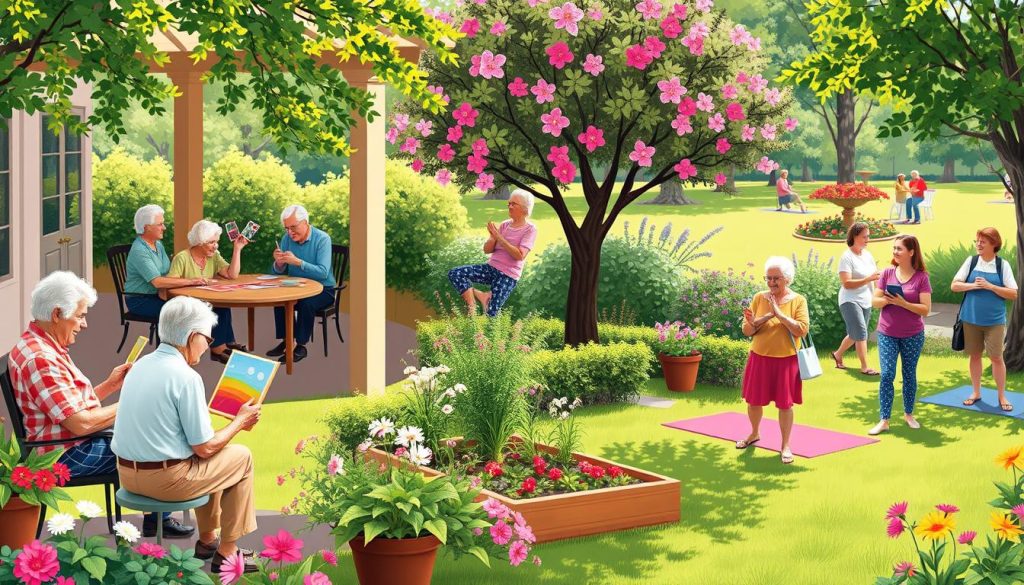
Cultural Events and Workshops
Going to cultural events and workshops is both fun and rewarding. Art classes, music festivals, or cooking workshops are great for learning new things and meeting others. Studies show that older adults who take classes are 20% more likely to make new friends.
| Activity Type | Social Benefit | Popularity Among Retirees |
|---|---|---|
| Hobby Groups | 30% increase in social interactions | High |
| Recreational Activities | Combines exercise and socialisation | Very High |
| Cultural Events/Workshops | 20% higher likelihood of new friendships | Moderate to High |
By taking part in these activities, you’re not just passing time. You’re making your life richer with meaningful connections and shared moments. Remember, it’s never too late to start a new hobby or join a group. Your next great friendship could be just a shared interest away!
Building Intergenerational Relationships
Intergenerational friendships are a great way for retirees to meet new people and keep up with the latest trends. They help bridge the gap between different age groups. This leads to better understanding and growth for everyone involved.
Studies show that these friendships are good for older adults’ mental health. A review found that older people who interacted with younger ones felt better about themselves and were less depressed.
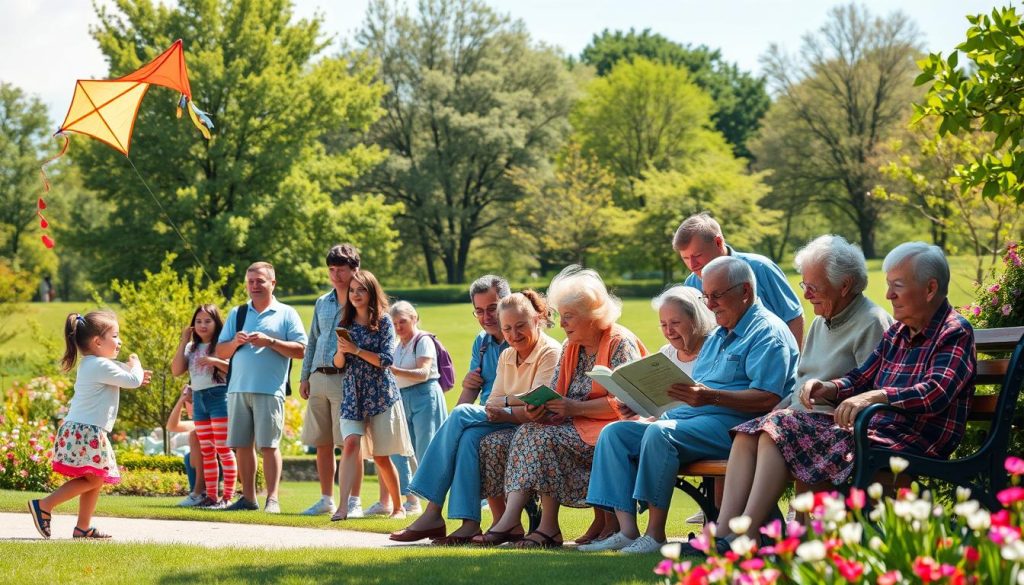
- Mentoring programmes in local schools or businesses
- Community projects that bring different age groups together
- Volunteering at youth-oriented organisations
- Participating in skill-sharing initiatives
These friendships bring new ideas and keep retirees connected with the world. By 2030, 20% of Britain’s population will be over 65. So, intergenerational friendships will become even more vital for our society.
| Benefits of Intergenerational Friendships | Impact on Older Adults |
|---|---|
| Improved cognitive function | Enhanced memory and mental agility |
| Expanded social networks | Reduced feelings of isolation |
| Increased self-esteem | Greater sense of purpose and value |
| Access to new technologies | Improved digital literacy |
While starting intergenerational friendships can be tough, the benefits are worth it. They offer a chance for mutual learning and growth. Embracing these connections can make retirement more exciting and rewarding.
Maintaining Active Lifestyle Through Social Networks
Living an active retirement is linked to strong social bonds. Social fitness groups help retirees stay fit and build friendships.
Group Exercise Activities
Group exercise classes can change a retiree’s life. They boost health and offer a place to meet new people. Yoga, tai chi, and aerobics suit all fitness levels.
Walking Clubs and Outdoor Groups
Walking clubs mix exercise with socialising. A 30-minute walk can lift your mood and keep you healthy. In fact, 80% of seniors feel more active with friends.
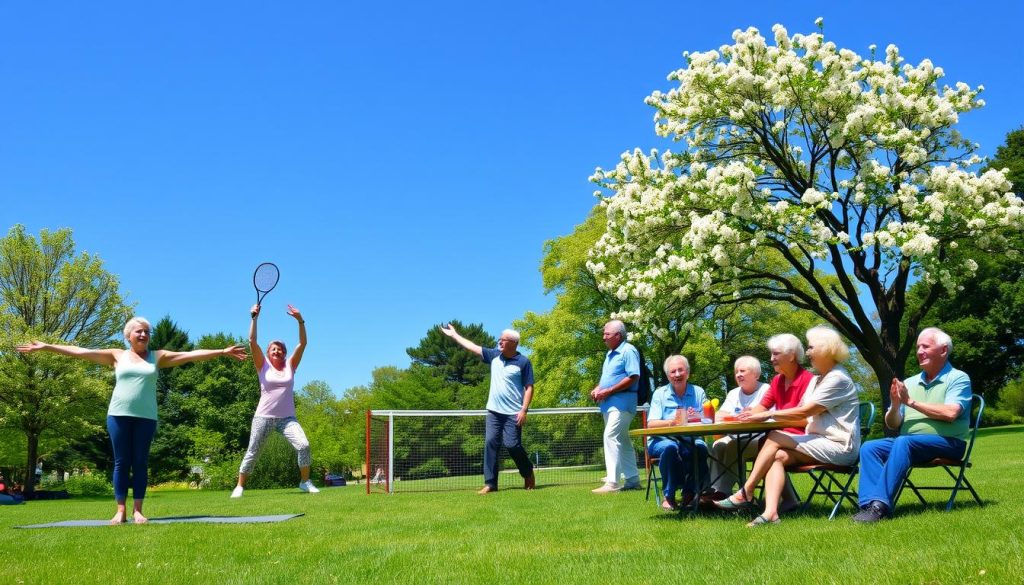
Wellness Communities
Wellness communities unite people who care about health. They offer meditation, nutrition talks, and fitness classes. Being part of these groups can make retirees 25% happier.
| Activity | Benefits | Social Impact |
|---|---|---|
| Group Exercise Classes | Improved physical fitness, balance, and coordination | Regular interaction with peers, shared goals |
| Walking Clubs | Cardiovascular health, weight management | Casual conversations, exploring new areas together |
| Wellness Communities | Holistic health improvement, stress reduction | Knowledge sharing, support network |
Joining these activities can make retirement more active. It also lowers the risk of chronic diseases and builds strong friendships.
Family Network Enhancement Strategies
Retirement is a great time to make family bonds stronger. It’s a chance to spend more time with loved ones. This shift helps us focus on the people who matter most.

Research shows that retirement makes family ties tighter. It weakens ties with work friends but strengthens family bonds. Women often choose family over friends during this time. For many, being a grandparent is a key joy.
“Being a grandparent is the single most important and satisfying thing in my life. I get to enjoy the pleasures of grandchildren without all the responsibility.”
To make family ties stronger in retirement, try these ideas:
- Schedule regular video calls with distant family members
- Plan family gatherings or holidays
- Create new family traditions or activities
- Share your life experiences and family history with younger generations
- Engage in shared hobbies or interests with adult children or grandchildren
Building strong family ties in retirement brings happiness. It also helps your health and can make you live longer. Use this time to create lasting, meaningful connections with your family.
| Aspect | Pre-Retirement | Post-Retirement |
|---|---|---|
| Social Network Size | Larger, more diverse | Smaller, more focused |
| Relationship Intensity | Lower average emotional involvement | Higher average emotional involvement |
| Family Time | Limited by work commitments | Increased availability for family |
| Grandparenting Role | Often limited or part-time | More active and engaged |
Regular Communication Methods
Keeping in touch in retirement is key for a lively social life and good mental health. The right tools help seniors stay connected and keep relationships strong.
Digital Communication Tools
The digital world offers many ways to stay in touch. Video calls, like Zoom, are now a hit, with 70% of retirees saying they feel as close as in real life. Social media also helps, boosting interaction by 50% for many seniors.
Traditional Networking Approaches
Older methods are also effective. Phone calls, letters, and face-to-face meetings are cherished. In fact, 55% of retirees go to work reunions to catch up and grow their networks.
Scheduling Regular Meet-ups
Being consistent is important in retirement. Using a shared online calendar can make everyone more aware of each other’s plans by 45%. Regular social activities strengthen bonds and open doors to new friendships by 30%.

| Communication Method | Impact on Social Connections |
|---|---|
| Video Calls | 70% feel as connected as in-person meetings |
| Social Media | 50% increase in interaction frequency |
| Work Reunions | 55% of retirees attend annually |
| Shared Online Calendar | 45% increase in event awareness |
Using both digital and traditional ways to communicate, retirees can keep their social circle vibrant. This leads to a more rewarding retirement.
Conclusion
Growing your network in retirement is key to keeping social connections strong. This article has shown ways for retirees to expand their social circles. With digital platforms and community involvement, the chances for growth are endless.
Studies reveal that 79% of people aged 45 and older worry about having enough savings for retirement. Building a strong social network is vital. It can lead to new opportunities and support. Also, 69% of those in network marketing do it to earn extra income, a chance for retirees to explore.
Retirement is more than just money; it’s about making meaningful connections and staying active. By using these networking tips, retirees can fight off loneliness, keep their minds sharp, and feel better overall. Investing in connections can change retirement, opening up new experiences and growth.
